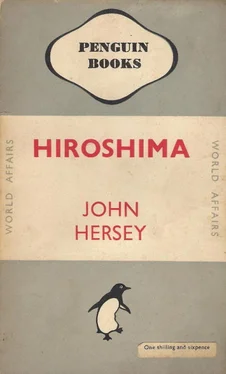John Hersey - Hiroshima
Здесь есть возможность читать онлайн «John Hersey - Hiroshima» весь текст электронной книги совершенно бесплатно (целиком полную версию без сокращений). В некоторых случаях можно слушать аудио, скачать через торрент в формате fb2 и присутствует краткое содержание. Город: London, Год выпуска: 1946, Издательство: Penguin Books, Жанр: История, на английском языке. Описание произведения, (предисловие) а так же отзывы посетителей доступны на портале библиотеки ЛибКат.
- Название:Hiroshima
- Автор:
- Издательство:Penguin Books
- Жанр:
- Год:1946
- Город:London
- ISBN:нет данных
- Рейтинг книги:4 / 5. Голосов: 1
-
Избранное:Добавить в избранное
- Отзывы:
-
Ваша оценка:
- 80
- 1
- 2
- 3
- 4
- 5
Hiroshima: краткое содержание, описание и аннотация
Предлагаем к чтению аннотацию, описание, краткое содержание или предисловие (зависит от того, что написал сам автор книги «Hiroshima»). Если вы не нашли необходимую информацию о книге — напишите в комментариях, мы постараемся отыскать её.
Hiroshima — читать онлайн бесплатно полную книгу (весь текст) целиком
Ниже представлен текст книги, разбитый по страницам. Система сохранения места последней прочитанной страницы, позволяет с удобством читать онлайн бесплатно книгу «Hiroshima», без необходимости каждый раз заново искать на чём Вы остановились. Поставьте закладку, и сможете в любой момент перейти на страницу, на которой закончили чтение.
Интервал:
Закладка:
When he dared, Mr. Tanimoto raised his head and saw that the rayon man’s house had collapsed. He thought a bomb had fallen directly on it. Such clouds of dust had risen that there was a sort of twilight around. In panic, not thinking for the moment of Mr. Matsuo under the ruins, he dashed out into the street. He noticed as he ran that the concrete wall of the estate had fallen over—toward the house rather than away from it. In the street, the first thing he saw was a squad of soldiers who had been burrowing into the hillside opposite, making one of the thousands of dugouts in which the Japanese apparently intended to resist invasion, hill by hill, life for life; the soldiers were coming out of the hole, where they should have been safe, and blood was running from their heads, chests, and backs. They were silent and dazed.
Under what seemed to be a local dust cloud, the day grew darker and darker.
At nearly midnight, the night before the bomb was dropped, an announcer on the city’s radio station said that about two hundred B-29s were approaching southern Honshu and advised the population of Hiroshima to evacuate to their designated “safe areas.” Mrs. Hatsuyo Nakamura, the tailor’s widow, who lived in the section called Nobori-cho and who had long had a habit of doing as she was told, got her three children—a ten-year-old boy, Toshio, an eight-year-old girl, Yaeko, and a five-year-old girl, Myeko—out of bed and dressed them and walked with them to the military area known as the East Parade Ground, on the northeast edge of the city. There she unrolled some mats and the children lay down on them. They slept until about two, when they were awakened by the roar of the planes going over Hiroshima. As soon as the planes had passed, Mrs. Nakamura started back with her children. They reached home a little after two-thirty and she immediately turned on the radio, which, to her distress, was just then broadcasting a fresh warning. When she looked at the children and saw how tired they were, and when she thought of the number of trips they had made in past weeks, all to no purpose, to the East Parade Ground, she decided that in spite of the instructions on the radio, she simply could not face starting out all over again. She put the children in their bedrolls on the floor, lay down herself at three o’clock, and fell asleep at once, so soundly that when the planes passed over later, she did not waken to their sound.
The siren jarred her awake at about seven. She arose, dressed quickly, and hurried to the house of Mr. Nakamoto, the head of her Neighbourhood Association, and asked him what she should do. He said that she should remain at home unless an urgent warning—a series of intermittent blasts of the siren—was sounded. She returned home, lit the stove in the kitchen, set some rice to cook, and sat down to read that morning’s Hiroshima Chugoku . To her relief, the all-clear sounded at eight o’clock. She heard the children stirring, so she went and gave each of them a handful of peanuts and told them to stay on their bedrolls, because they were tired from the night’s walk. She had hoped that they would go back to sleep, but the man in the house directly to the south began to make a terrible hullabaloo of hammering, wedging, ripping, and splitting. The prefectural government, convinced, as everyone in Hiroshima was, that the city would be attacked soon, had begun to press with threats and warnings for the completion of wide fire lanes, which, it was hoped, might act in conjunction with the rivers to localise any fires started by an incendiary raid; and the neighbour was reluctantly sacrificing his home to the city’s safety. Just the day before, the prefecture had ordered all able-bodied girls from the secondary schools to spend a few days helping to clear these lanes, and they started work soon after the all-clear sounded.
Mrs. Nakamura went back to the kitchen, looked at the rice, and began watching the man next door. At first, she was annoyed with him for making so much noise, but then she was moved almost to tears by pity. Her emotion was specifically directed toward her neighbour, tearing down his home, board by board, at a time when there was so much unavoidable destruction, but undoubtedly she also felt a generalised, community pity, to say nothing of self-pity. She had not had an easy time. Her husband, Isawa, had gone into the Army just after Myeko was born, and she had heard nothing from or of him for a long time, until, on March 5, 1942, she received a seven-word telegram: “Isawa died an honourable death at Singapore.” She learned later that he had died on February 15th, the day Singapore fell, and that he had been a corporal. Isawa had been a not particularly prosperous tailor, and his only capital was a Sankoku sewing machine. After his death, when his allotments stopped coming, Mrs. Nakamura got out the machine and began to take in piecework herself, and since then had supported the children, but poorly, by sewing.
As Mrs. Nakamura stood watching her neighbour, everything flashed whiter than any white she had ever seen. She did not notice what happened to the man next door; the reflex of a mother set her in motion toward her children. She had taken a single step (the house was 1,350 yards, or three-quarters of a mile, from the centre of the explosion) when something picked her up and she seemed to fly into the next room over the raised sleeping platform, pursued by parts of her house.
Timbers fell around her as she landed, and a shower of tiles pommelled her; everything became dark, for she was buried. The debris did not cover her deeply. She rose up and freed herself. She heard a child cry, “Mother, help me!” and saw her youngest—Myeko, the five-year-old—buried up to her breast and unable to move. As Mrs. Nakamura started frantically to claw her way toward the baby, she could see or hear nothing of her other children.
In the days right before the bombing, Dr. Masakazu Fujii, being prosperous, hedonistic, and at the time not too busy, had been allowing himself the luxury of sleeping until nine or nine-thirty, but fortunately he had to get up early the morning the bomb was dropped to see a house guest off on a train. He rose at six, and half an hour later walked with his friend to the station, not far away, across two of the rivers. He was back home by seven, just as the siren sounded its sustained warning. He ate breakfast and then, because the morning was already hot, undressed down to his underwear and went out on the porch to read the paper. This porch—in fact, the whole building—was curiously constructed. Dr. Fujii was the proprietor of a peculiarly Japanese institution: a private, single-doctor hospital. This building, perched beside and over the water of the Kyo River, and next to the bridge of the same name, contained thirty rooms for thirty patients and their kinfolk—for, according to Japanese custom, when a person falls sick and goes to a hospital, one or more members of his family go and live there with him, to cook for him, bathe, massage, and read to him, and to offer incessant familial sympathy, without which a Japanese patient would be miserable indeed. Dr. Fujii had no beds—only straw mats—for his patients. He did, however, have all sorts of modern equipment: an X-ray machine, diathermy apparatus, and a fine tiled laboratory. The structure rested two-thirds on the land, one-third on piles over the tidal waters of the Kyo. This overhang, the part of the building where Dr. Fujii lived, was queer-looking, but it was cool in summer and from the porch, which faced away from the centre of the city, the prospect of the river, with pleasure boats drifting up and down it, was always refreshing. Dr. Fujii had occasionally had anxious moments when the Ota and its mouth branches rose to flood, but the piling was apparently firm enough and the house had always held.
Читать дальшеИнтервал:
Закладка:
Похожие книги на «Hiroshima»
Представляем Вашему вниманию похожие книги на «Hiroshima» списком для выбора. Мы отобрали схожую по названию и смыслу литературу в надежде предоставить читателям больше вариантов отыскать новые, интересные, ещё непрочитанные произведения.
Обсуждение, отзывы о книге «Hiroshima» и просто собственные мнения читателей. Оставьте ваши комментарии, напишите, что Вы думаете о произведении, его смысле или главных героях. Укажите что конкретно понравилось, а что нет, и почему Вы так считаете.












